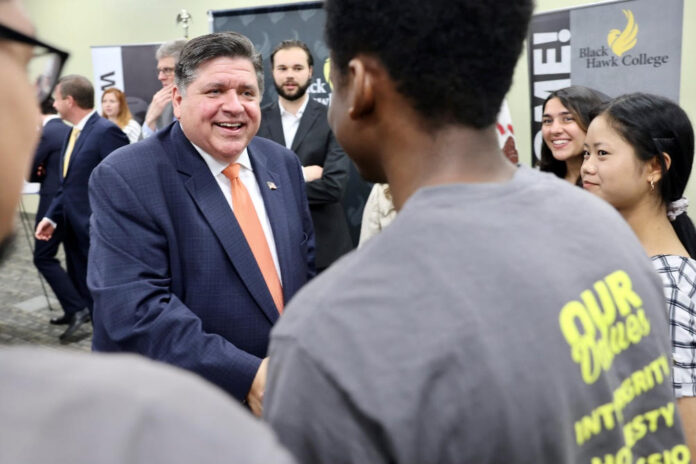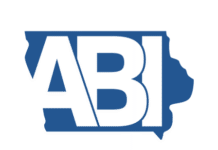
Illinois Gov. J.B. Pritzker used a visit to Black Hawk College on Tuesday, June 6, to celebrate a record state investment in higher education in Fiscal Year 2024 and the state’s improved economic outlook that made it possible. “In a lot of states that doesn’t get a lot of applause because it happens all the […]
Already a subscriber? Log in
Want to Read More?
Get immediate, unlimited access to all subscriber content and much more.
Learn more in our subscriber FAQ.
- Unparalleled business coverage of the Quad Cities
- Immediate access to subscriber-only content on our website.
- 52 issues per year delivered digitally, in print or both.
- Support locally owned and operated journalism.
Do you want to read and share this article without a paywall?
Click here to purchase a paywall bypass linkIllinois Gov. J.B. Pritzker used a visit to Black Hawk College on Tuesday, June 6, to celebrate a record state investment in higher education in Fiscal Year 2024 and the state’s improved economic outlook that made it possible.
“In a lot of states that doesn’t get a lot of applause because it happens all the time, but in Illinois having five balanced budgets in a row is a big deal,” the governor told a crowd of about 50 gathered at the Moline campus’ Sustainable Technology Center.
“With it we are making it possible for nearly every student from a low-, moderate- or middle-income family to get a degree or certification from Black Hawk College without out-of-pocket costs.”
The BHC stop is part of a statewide tour designed to allow Mr. Pritzker to share details of the budget for the new fiscal year that begins July 1. Among the highlights is continuing to shore up a "rainy day" fund that is set to surpass $2 billion, elimination of a massive state bill backlog, and $1 trillion in GDP.
In his travels, the Chicago Democratic governor also has touted new initiatives to fight homelessness and a $20 million investment in a new Illinois Grocery Initiative. Those funds will help municipalities set up grocery cooperatives and assist independent grocers in opening or expanding operations in unserved or underserved rural towns and urban neighborhoods alike.
The primary focus of the Quad Cities stop, however, was a higher education investment that represents the biggest increase in funding in two decades.
That new $100 million investment in MAP (Monetary Award Program) Grant funding will allow anyone at or below the median income to attend community college for free. For example, the governor said, a student can now pair a state scholarship with a federal Pell grant and go to BHC with no out-of-pocket costs and no student loans.
In addition, he said, the new state budget grows its direct support for higher education institutions. That includes investment at BHC and Western Illinois University.
“When we’re supporting our students we’re making it possible for them to choose where they want to go to school,” he said. “And when we’re supporting our higher ed institutions they are able to make the kinds of investments that they need to make in faculty and the quality of life on campus.”
Among those applauding the new higher-ed budget was Black Hawk College President Tim Wynes, who retires this summer.
“Community colleges were created to increase access to higher education and training,” he told the gathering. “Access is not enough. Our students need the necessary support to reach completion of their goals.”
But now, with the historic higher ed budget increase and a 75% increase in MAP grant funds since 2019, he said, “those actions directly impact the lives of our students who far too often are workers who attend college part time because of financial constraints.”
For example, he said, “Last year, 843 students received MAP grants, combined with a Pell Grant.”
Without that funding, Mr. Wynes added they would “otherwise have been shut out of a college education or training” and could not have graduated or transferred debt-free. Now they can.
Among the students who are grateful for MAP grants is Lauren Rogan, a recent Black Hawk College honors student, who is transferring to University of Illinois at Springfield.
She shared the stage with the governor and thanked him for his work to increase higher education support. Like many community college students, she said, she tried to attend BHC full time while she also worked full time.
“As someone who lived paycheck to paycheck I wanted to get an education to increase my career opportunities but was concerned about ending up in debt which would make everything even harder,” she said.
It wasn’t easy. Then she received a MAP grant and got a part-time job on campus that allowed her to graduate with honors and now afford to further her studies.
In celebrating those new investments, both Mr. Pritzker and Illinois state Sen. Mike Halpin, D-Rock Island, talked Tuesday about the budget discipline that was required to create the new investment.
“Just six years ago our state had $17 billion in unpaid bills,” Mr. Pritzker told the crowd. “Today we have no bill backlog.”
The state’s credit rating has been upgraded eight times and that improved financial outlook helped Illinois’ economy to grow to $1 trillion of Gross Domestic Product. “That makes Illinois the fifth largest state in GDP in the nation and the 18th largest economy in the entire world,” he said.
“Illinois is standing on firmer ground than it has in quite some time, and it’s why we’re able to make the important investments that we’re announcing today.”
Mr. Halpin also highlighted the higher-ed investments in the current budget, which included a $15 million increase in funding for the AIM High merit-based scholarship for students attending Illinois public universities. The scholarships helps make higher education more attainable for students across the state.
“This was another tremendous session for higher education in Illinois,” the chair of the Senate Higher Education Committee said.




